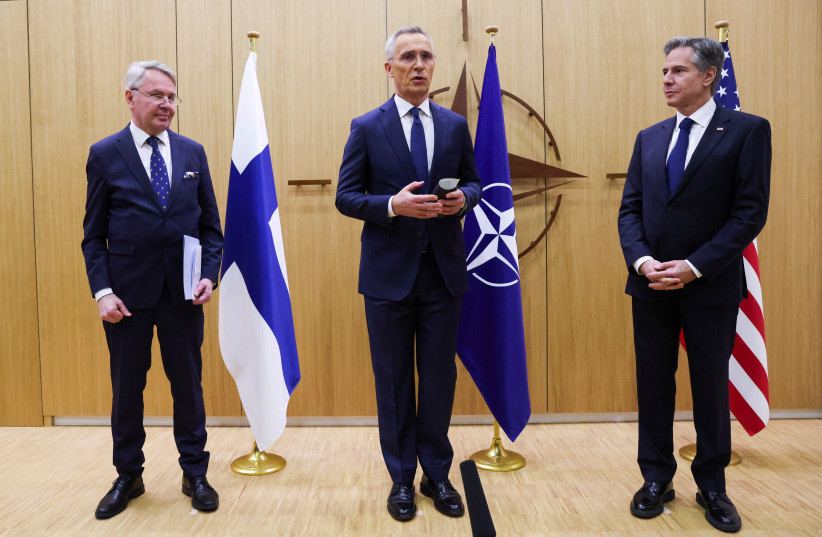Despite Turkish agreement, Sweden’s NATO bid still hangs in the balance
Despite Turkey’s recent agreement to ratify Sweden’s bid to join the NATO alliance this October, tensions have continued to rise around the issue, especially following the recent burnings and desecrations of the Quran in Stockholm and in Copenhagen.
Various Muslim countries, including Iran, Iraq, and Jordan, have condemned the Nordic countries for allowing such actions to be carried out and for not punishing the perpetrators. In response, those countries have stated that they do not support the actions but they do protect the right to freedom of expression by their citizens. Protests have surged in front of those countries’ embassies in the region.
Marten Lofberg, chairman of the Stockholm-based international expert network WorldBright, told The Media Line that the protesters “do not really understand the difference between, on the one hand, the states tolerating the right to express these views, and on the other hand, the states tolerating the positions themselves. Because they do not.”
Quran burnings in Sweden persist
In June, an Iraqi Christian in Sweden burned the Quran in Stockholm, then in July stomped on and kicked another Quran in the Swedish capital. In late July, a Danish far-right group burned a Quran in Copenhagen. The desecrations sparked widespread protests in several Muslim countries.
On the issue of Turkey’s resistance to ratifying Sweden’s bid to join NATO, Lofberg said he believed that “the Quran burning has also been instrumentalized by the Turks.”
 NATO Secretary-General Jens Stoltenberg speaks as Finnish Foreign Minister Pekka Haavisto hands his nation’s accession document to US Secretary of State Antony Blinken during a joining ceremony at the NATO foreign ministers’ meeting at the Alliance’s headquarters in Brussels, Belgium April 4, 2023. (credit: Johanna Geron/Pool/Reuters)
NATO Secretary-General Jens Stoltenberg speaks as Finnish Foreign Minister Pekka Haavisto hands his nation’s accession document to US Secretary of State Antony Blinken during a joining ceremony at the NATO foreign ministers’ meeting at the Alliance’s headquarters in Brussels, Belgium April 4, 2023. (credit: Johanna Geron/Pool/Reuters)Both Sweden and Finland applied for NATO membership in May 2022, following the Russian invasion of Ukraine in February of that year. Finland joined the alliance in April this year. However, Turkey objected to Sweden’s bid, relenting only in July, at the NATO summit in Vilnius, Lithuania, reportedly after receiving concessions from the United States. Sweden’s bid is expected to be ratified when NATO next convenes, in October.
Turkey has stated that it opposed Sweden’s bid due to its lack of action against the Kurdistan Workers Party (PKK), which has been designated a terrorist organization by Turkey, the US, and the European Union.
“It would be in Sweden’s favor if they take concrete steps in the fight against terrorist organizations and on the extradition of terrorists,” Turkish President Recep Tayyip Erdoğan said in late July.
One of Turkey’s main complaints is Sweden’s refusal to extradite several Turkish citizens accused by Turkey of being members of terrorist groups.
Before ratifying Sweden as a NATO member, Turkey expects to see Sweden take concrete action against those groups, Dr. Turgut Kerem Tuncel, senior analyst at the Center for Eurasian Studies in Ankara, told The Media Line.
However, Lofberg said that Sweden did not support the PKK.
“Swedish political parties have relations with Turkish political parties, which in turn have relations with the PKK, but that’s much further away,” he said.
“Although it’s clear that many people who sympathize with the Kurdish cause are residing in Sweden, and therefore there is a strong hub of people supporting the Kurdish cause, the official government position in Sweden is not that different from any other Western country.”
Marten Lofberg, chairman of Stockholm-based WorldBright
Lofberg said that with regard to Sweden’s former official relations with the Kurdish provincial administration in northern Syria, many other Western countries had maintained such ties too.
“The issue of official relations between Sweden and Kurdish groups is not really an actual one,” he said. “Although it’s clear that many people who sympathize with the Kurdish cause are residing in Sweden, and therefore there is a strong hub of people supporting the Kurdish cause, the official government position in Sweden is not that different from any other Western country.”
Tuncel said that Turkish media often reported that Swedish-made weapons had been found with “neutralized” PKK and associated terrorists “and in their depots and stashes.” He said that another Turkish expectation was that the Swedish authorities would prevent Swedish-made weapons from reaching those groups.
Speaking of Turkey’s position of power over Sweden’s NATO bid, Lofberg said that the Turkish government had a history of using its strength for domestic political and geopolitical gains.
He cited Erdoğan’s recent effort to tie Sweden’s NATO bid in with Turkey’s negotiations to join the European Union.
“The most recent statements by the Turkish president brought in the whole EU membership discussion and wanted to use the situation to pressure the European Union in order to open negotiations with Turkey,” he said.
Erdoğan has made no secret of that, telling a news conference in Istanbul: “First, let’s clear Turkey’s way in the European Union, then let’s clear the way for Sweden, just as we paved the way for Finland.”





Comments are closed.